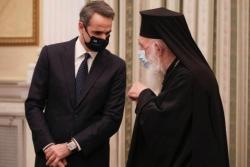Epiphany in Greece
Epiphany is one of the most sacred Greek Orthodox celebrations, rich in many Christian traditions which also date back to ancient times. Epiphany (also called Theofania or Fota) is celebrated annualy on 6th January and is a day of joy and brightness, as Christians celebrate the baptism of Jesus Christ by John the Baptist. The most important ritual is the 'blessing of the waters' which is performed by the Greek Orthodox priest in seaside and coastal parts of Greece like Ermioni, is the priest throwing a special cross into the water and swimmers jumping in the water to recover it. People refer to this water ritual as 'Yala-Yala'. It is believed that the person who captures the Holy Cross and returns it to the priest will be blessed with good fortune for the whole year, the runner-up retrieves a wooden Holy Icon.
According to archaeologists, Christians began celebrating Epiphany from as early as AD 200 in the Greek-speaking Eastern parts of the Roman Empire, and these celebrations began as a commemoration of Jesus' baptism. However, Western European Christians have traditionally associated Epiphany with the visit of the three Magi (kings or wise men) to the newborn Jesus Christ.
Like Christmas and New Year's Eve, the Epiphany holiday in Greece has its own carols (kalanda) as well, as children sing the 'Fota Kalanda' in exchange for money or gifts. During the second Covid-19 national lockdown in Greece on 11th December 2020, churches were permitted to open on Christmas Eve/Day, New Year's Eve/Day and Epiphany only, with all the necessary protective measures in place and limitations on faithful allowed inside. Although the Epiphany 'blessing of the waters' ritual had been banned, priests were planning to bless the waters within the churches. However, on Saturday 2nd January 2021, the Greek Government decided further restrictions had to be taken due to the global pandemic crisis and one of these measures was a ban for the opening of churches for the Epiphany.
 On Monday 4th January, Greece’s powerful Orthodox Church ordered its priests to defy government orders to remain closed and instructed its thousands of parishes to open for Epiphany celebrations on 6th January. The Church’s ruling body, the Holy Synod, issued a statement Monday directing priests to admit worshippers during indoor services for Wednesday’s feast of the Epiphany, which commemorates the baptism of Christ and is a major holiday on the Orthodox Church calendar. The Holy Synod said it "does not accept" the new restrictions, in force from 3rd to 11th January, and would send a letter of protest to the government. This is the first time the Orthodox Church and the Greek government have openly clashed over the lockdown restrictions. A compromise needed to be reached soon.
On Monday 4th January, Greece’s powerful Orthodox Church ordered its priests to defy government orders to remain closed and instructed its thousands of parishes to open for Epiphany celebrations on 6th January. The Church’s ruling body, the Holy Synod, issued a statement Monday directing priests to admit worshippers during indoor services for Wednesday’s feast of the Epiphany, which commemorates the baptism of Christ and is a major holiday on the Orthodox Church calendar. The Holy Synod said it "does not accept" the new restrictions, in force from 3rd to 11th January, and would send a letter of protest to the government. This is the first time the Orthodox Church and the Greek government have openly clashed over the lockdown restrictions. A compromise needed to be reached soon.
Following their meeting, Archbishop Ieronymos on Tuesday called on all Metropolitans, the heads of ecclesiastical districts, to help ensure the diligent observance of all health safety restrictions during Epiphany Day church services on Wednesday. With this, the water blessing ceremonies traditionally carried out outdoors on Epiphany Day will, this year, be carried out indoors at churches, and there will be no public litanies or processions. The Greek government relented and allowed limited attendance at churches celebrating the feast of the Epiphany, reversing a ban on attendance. In Ermioni, an Epiphany church service was held in the morning at the 9th Century Byzantine Taxiarches (Archangels) church in the old village, the limited service was relayed to the faithful of Ermioni by loudspeaker only.